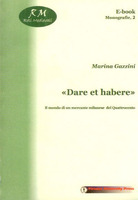Dare et habere

Download Url(s)
https://library.oapen.org/bitstream/20.500.12657/34878/1/345484.pdf---
https://library.oapen.org/bitstream/20.500.12657/34878/1/345484.pdf
---
https://library.oapen.org/bitstream/20.500.12657/34878/1/345484.pdf
Author(s)
Marina, Gazzini
Language
ItalianAbstract
The Italian cities of the last centuries of the Middle Ages continued to witness – alongside a progressive crystallisation of the social hierarchies – the economic and social ascent of individuals belonging to the 'middle class’. These were homines novi who, without resorting to dynastic connections and often rejecting the associative model of the guilds, managed to build fortunes and dignity through trade, enterprise, the exploitation of the land, the solidarity of district and parish and the management of welfare. Emblematic of such careers is the figure of an economic agent originating from the rural district, Donato Ferrario da Pantigliate, who in 1429 founded in Milan a devotional and welfare institute, the Scuola della Divinità. The book reconstructs the social, economic and spiritual conduct of Donato, placing it within the urban context of Milan in the first half of the fifteenth century. Le città italiane degli ultimi secoli del Medioevo videro ancora, accanto a un progressivo irrigidirsi delle gerarchie sociali, l'ascesa economica e sociale di individui appartenenti al 'ceto medio': homines novi che, senza ricorrere a legami di casata e spesso rifiutando il modello associazionistico delle corporazioni, riuscirono a costruirsi fortuna e dignità grazie al commercio, all'imprenditoria, allo sfruttamento della terra, alle solidarietà di quartiere e di parrocchia, alla gestione dell'assistenza. Emblematica di questi percorsi di affermazione è la figura di un operatore economico originario del contado, Donato Ferrario da Pantigliate, fondatore nel 1429 a Milano di un ente devozionale e assistenziale, la Scuola della Divinità, personaggio del quale si vanno qui a ricostruire i comportamenti sociali, economici e spirituali inserendoli nel contesto urbano milanese della prima metà del Quattrocento.
Keywords
middle ages; history; società; society; donato ferrario da pantigliate; storia; medioevoPublisher
Firenze University PressPublisher website
www.fupress.com/Publication date and place
2002Series
Reti Medievali E-Book,Classification
History and Archaeology
CE period up to c 1500
